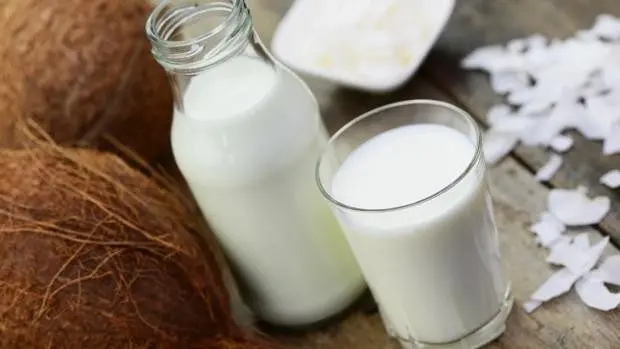Contents
Vegetable drinks: how to choose the best ones and which ones to avoid
Nutrition
That it is rich in calcium and that it does not contain added oils are just some of the things that should be looked at on the label of these drinks

The dairy aisle that we find in supermarkets is getting longer and longer and that makes it difficult to choose the type of milk we want to consume. Skimmed, semi-skimmed, whole or lactose-free are the most common, but now we also find Almond milk, oatmeal or coconut, products with healthy nutrients that are not always a good option.
In general, it must be assumed that the plant drinks are not nutritionally interesting: “They are an option to drink something or to accompany coffee, but it is not a food whose consumption is recommended for its nutritional properties”, indicates dietitian-nutritionist María Sanchidrián. Of course, as he says, there is an exception … «The only exception is the soy drink since this is the only vegetable drink that gives us a good supply of protein, similar to that of the Cow milk. In addition, this protein is complete, that is, it contains all the amino acids necessary to synthesize our own proteins.
La soy drink enriched in calcium contains the same amount of this mineral as cow’s milk and the same percentage of it is absorbed, so it is a good substitute.
If we finally opt for a vegetable drink, be it oatmeal, soy, almond or another type, the main thing is to make sure that they do not have added sugar, syrups or syrups (which are sugars). This is looked at in the ingredient list and, as the expert says, the vegetable drinks chocolate or vanilla flavor usually have a lot.
Cereal-based drinks (rice, oats, spelled, quinoa), meanwhile, contain sugar naturally present in the food in question: «When this amount is 5g / 100ml it is acceptable, since it is the same amount of natural sugar that has cow’s milk (lactose, which is a sugar) and preferably should not contain sweeteners, which in addition to, in general, negatively affect the intestinal microbiota, increase our sweetness threshold altering the palate and the perception of what It is ‘sweet enough’ and therefore ‘rich’, ”he says.
The second thing to look at is the amount of food (raw material) that have been used for its elaboration. «The more quantity, the better. 13-15% is fine, for example. There are many vegetable drinks made from nuts, such as almonds or hazelnuts, which only contain 2-3% of the dried fruit, which is why it is very expensive ‘water’ ”, says the expert.
The third thing to look for is that it is enriched in calcium. As vegetable drinks are generally used as a substitute for cow’s milk, María Sanchidrián says that it is interesting to have that portion of calcium covered in an enriched product.
Finally, do not have added oils such as sunflower or rapeseed, which are not healthy oils. “The amount they usually carry is very small (1-2%), so if the drink in question meets the other conditions, carrying a little oil would not be a reason to discard it.”
Taking light soy drink or ‘light’ “does not make sense”, because part of the fat that soy provides is omega 3. In addition, to compensate, they reduce the amount of raw material and add sugar as an ingredient so that the drink is bearable later having removed some of its fat.
The fact that the drink is organic does not imply that it is healthier, as the nutritionist María Sanchidrián says (@sanatecomiendo). If it has sugar, etc., «will remain unhealthy, so we must continue to look at the factors that we have discussed. “Although it is preferable to dispense with traces of pesticides in food, in the case of drinks it is a bit ridiculous because a large part of the product is water. It is much more worth buying organic oats, rice or dried fruits directly instead of their corresponding drinks, “he concludes.









